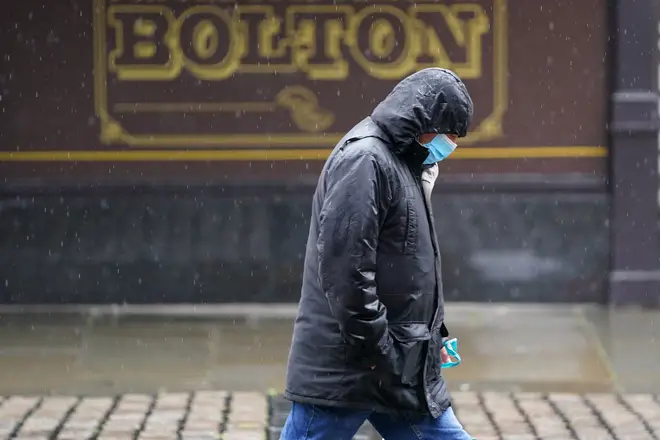
Henry Riley 4am - 7am
8 October 2020, 22:26 | Updated: 8 October 2020, 22:38

The threat of a second national lockdown looms over Britain as the number of coronavirus cases rises and hospitals fill with patients – but what evidence is there to suggest more rules would curb its spread?
10 million people in northern England face a tougher lockdown from Monday, dealing another blow for an already hard-hit hospitality industry which has seen pubs, bars and restaurants forced to adhere to a strict 10pm curfew on customers.
Hundreds of businesses are on their knees, with one business owner in Liverpool saying it felt like the “guillotine is about to drop.”
Read more: Health Secretary warns UK is at 'perilous moment' in coronavirus pandemic
Read more: UK coronavirus cases jump by 17,540 - 3,400 more than yesterday
More than 210,000 jobs have been lost since lockdown began in March, with huge swathes of cuts coming from the hospitality and aviation sectors.
Experts from the Royal College of Psychiatrists have also warned of a "looming" mental health crisis which has been fuelled by the pandemic, which could add pressure to already stretched services.

Nick Ferrari confronts Robert Jenrick over evidence for 10pm curfew
The WHO estimates that nine in 10 (93%) countries have seen services disrupted or halted at a time when mental health needs are increasing.
Bereavement, isolation, loss of income and fear are triggering mental health conditions or exacerbating existing ones, the global health body warned.
Many people are facing increased levels of alcohol or drug use, anxiety and insomnia, it added.
Politicians in Manchester, Liverpool, Newcastle and Sheffield have also raged at "diktats announced without notice" and ministers treating the north "like a petri dish for experimentation".
The proposals have also lead to accusations of a north-south divide, with northern leaders saying southerners now face far looser restrictions on their daily lives.
Greater Manchester mayor Andy Burnham reacted angrily, tweeting: "No discussion. No consultation. Millions of lives affected by Whitehall diktat. It is proving impossible to deal with this Government."

Robert Jenrick: Local lockdowns 'haven't given results we would have wanted'
At the peak of lockdown, pregnant women had to go to scans and appointments alone, and their partners were unable to stay on post-natal wards after they had given birth.
Thousands of academics have called for people who are less vulnerable to the effects of Covid-19 to be allowed to return to normal life.
A new declaration, which is earning thousands of signatures from medical professionals, academics and the general public, calls for a herd immunity approach to tackling the pandemic while protecting the most vulnerable populations.
Academics from the universities of Oxford, Nottingham, Edinburgh, Exeter, Cambridge, Sussex, York, St George's University of London, Strathclyde, Leicester, Queen Mary University of London and the University of East Anglia are among experts from around the world who have signed the declaration.
The so-called Great Barrington declaration states: "As infectious disease epidemiologists and public health scientists we have grave concerns about the damaging physical and mental health impacts of the prevailing Covid-19 policies, and recommend an approach we call Focused Protection.
"Current lockdown policies are producing devastating effects on short and long-term public health. The results (to name a few) include lower childhood vaccination rates, worsening cardiovascular disease outcomes, fewer cancer screenings and deteriorating mental health - leading to greater excess mortality in years to come, with the working class and younger members of society carrying the heaviest burden. Keeping students out of school is a grave injustice.

"Failure to use the time we bought might make 2nd lockdown impossible"
"Keeping these measures in place until a vaccine is available will cause irreparable damage, with the underprivileged disproportionately harmed.”
Professor John Edmunds, who is a a member of the Government's Scientific Advisory Group for Emergencies, said coronavirus is "holding a gun" to Boris Johnson's head and that policy makers had to make dreadful decisions about restrictions.
He said: " I don't think it's us (scientists) holding the guns to the Prime Minister's head, I think it's the virus."
Prof Edmunds added: "It's not our decision. It is their decision, it is a dreadful decision.
"There is no way out of this where harm isn't done, and you're balancing harm to one sector of society, in order to protect other sectors of society, and so on.
"It's dreadful. I have huge sympathy for the politicians that have to weigh up these things and come to a decision.
"And yes, sometimes I sort of criticise them for it, if I feel that they're not realising that the gun is pointing straight at their heads."